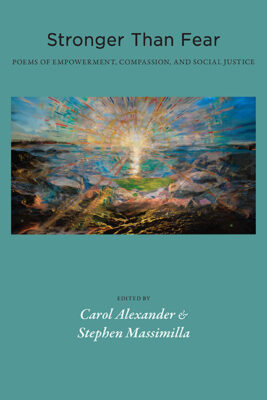Stronger than Fear: Poems of Empowerment, Compassion, and Social Justice, Carol Alexander & Stephen Massimilla, Eds.
Review by John Brantingham
One of the problems of evil is that it can and inevitably does shapeshift. We learn how to fight intolerance and ignorance in our youth, and it’s tempting to feel that we can move on. The problem is that if we do not constantly update our understanding of these forces of evil, we miss the ways that we are meant to grow and change. The anthology that Carol Alexander and Stephen Massimilla have compiled and edited gives us a way to exist in a world where we need to stay strong because we do not know where dark forces are coming from next and need to remain compassionate so to fight the forces within ourselves that might compound that evil. This anthology has collected the work of poets who have lived through and fought against those forces that would corrupt us as a culture, and they help to give us a way to move forward. An anthology like this is necessary, and it needs to be done humanely and empathetically. Alexander and Massimilla have done just that, and although it could not possibly be a comprehensive roadmap toward justice, the anthology Stronger than Fear: Poems of Empowerment, Compassion, and Social Justice is certainly a good start to help us stay focused and conscious of how to approach life today.
So much of the collection creates greater empathy in the reader by drawing us into the poets’ experiences, experiences we might or might not have access to. Ellen Bass’s “Ode to Invisibility” asks us to see the world from the point of view of a woman whose age and changing body has made her feel invisible.
I can be a friend to them all, even the magnificent young,
their bodies fluid as the curl of a wave.
I can wander up to any gilded boy, touch
his gaudy bicep, lean in confidentially. I’m invisible
as a star at noon, a grain of clear sand (127).
It has been said that we read so that we know we are not alone. That’s true I think, but this collection does more than that. Certainly anyone feeling invisible will gain strength from the courage of Bass’s honesty, but it also allows outsiders a perspective into what others are going through. As a man, I might understand conceptually what Bass is talking about, and certainly I’ve felt invisible, but this gives me insight into the special quality that exists for her and not me. Natasha Tretheway also brings us into a point-of-view in her persona poem, “Letter Home: New Orleans, November 1910” about an educated African-American woman trying to find employment in 1910:
Do I deceive
anyone? Were they to see my hands, brown
as your dear face, they’d know I’m not quite
what I pretend to be. I walk these streets
a white woman, or so I think, until I catch the eyes
of some stranger upon me, and then I must lower mine
a negress again (108).
The anthology reminds us of the injustice that is occurring now, and the courage that so many people have in facing it; it reminds us that we need compassion and courage for the people around us as well. Hala Alyan writes about Syria in “Aleppo”:
The Syria in my grandmother is a decade too old. When she dies, she will take it with her.
This is how a lone bomb can erase a lineage: the nice names for your mother, the ghost stories, the only song that put your child to sleep.
No one is evacuating me.
Your citadel fed to the birds. Your mosque. Someone will make an art project out of your tweets (36).
Part of what this anthology is doing is making sure that we do not forget what is happening in the world. It is easy to get caught up in our own problems to the point that we forget the world. The editors of this anthology make sure that we do not. Reginald Dwayne Betts writes about life in prison.
Prison is the sinner’s bouquet, house of shredded & torn
Dear John letters, upended grave of names, moon
Black kiss of a pistol’s flat side, time blueborn
& threaded into a curse, Lazarus of hustlers, the picayune
Spinning into beatdowns; breath of a thief stilled
By fluorescent lights, a system of 40 blocks,
empty vials, a hand full of purple cranesbills (40).
There is courage in being able to write about this experience directly and clearly. As the title of the anthology suggests, this is a collection that is stronger than fear.
There is a danger as well in believing that the purpose of this writing is simply to give people a glimpse into the world of those who have been abused or othered. This is not the point of this collection. This is far too complex a collection to have any singular point. It is as complex and fascinating as the writers who are included in it.
*

